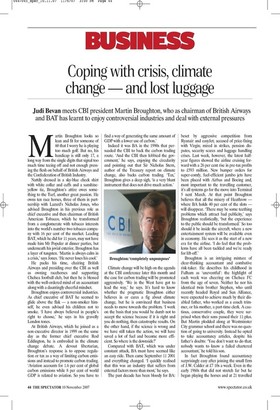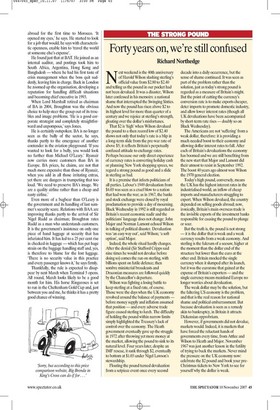Coping with crisis, climate change — and lost luggage
Judi Bevan meets CBI president Martin Broughton, who as chairman of British Airways and BAT has learnt to enjoy controversial industries and deal with external pressures Martin Broughton looks so lean and fit for someone of 60 that I worry he is playing too much golf. But no, his handicap is still only 17, a long way from the single digits that signal too much time teeing off and not enough pressing the flesh on behalf of British Airways and the Confederation of British Industry.
Nattily dressed in a sky-blue check shirt with white collar and cuffs and a sunshineyellow tie, Broughton's attire owes something to the Turf, another great passion. He owns ten race horses, three of them in partnership with Lazard's Nicholas Jones, who advised Broughton in his previous role as chief executive and then chairman of British American Tobacco, which he transformed from a conglomerate with tobacco interests into the world's number two tobacco company with 16 per cent of the market. Leading BAT, which he did for 11 years, may not have made him Mr Popular at dinner parties, but underneath his jovial exterior, Broughton has a layer of tungsten. 'Martin is always calm in a crisis,' says Jones. 'He never loses his cool.'
He packs his time, chairing British Airways and presiding over the CBI as well as owning racehorses and supporting Chelsea football club, but then he is blessed with the well-ordered mind of an accountant along with a dauntingly cheerful mindset.
Broughton enjoys controversial industries. As chief executive of BAT he seemed to glide above the flak — a non-smoker himself, he even advised his children not to smoke. 'I have always believed in people's right to choose,' he says in his gravelly London tones.
At British Airways, which he joined as a non-executive director in 1999 on the same day as the former chief executive Rod Eddington, he is embroiled in the climate change debate. A devout libertarian, Broughton's response is to oppose regulation or tax as a way of limiting carbon emissions and instead to promote carbon trading. 'Aviation accounts for 1.6 per cent of global carbon emissions while 8 per cent of world GDP is related to aviation. So you have to find a way of generating the same amount of GDP with a lower use of carbon.'
Indeed it was BA in the 1990s that persuaded the CBI to back the carbon trading route. 'And the CBI then lobbied the government,' he says, enjoying the circularity and pointing out that Sir Nicholas Stern, author of the Treasury report on climate change, also backs carbon trading. 'Tax,' Broughton gives a deep sigh, 'is a very blunt instrument that does not drive much action.'
Climate change will be high on the agenda at the CBI conference later this month and the case for carbon trading will be promoted aggressively. 'We in the West have got to lead the way,' he says. It's hard to know whether the pragmatic Broughton either believes in or cares a fig about climate change, but he is convinced that business needs to move towards the problem. 'I work on the basis that you would be dumb not to accept the science because if it is right and you do nothing, then catastrophe results. On the other hand, if the science is wrong and we have still taken the action, we will have saved a lot of fuel and become more efficient. So where is the downside?'
Compared with BAT, which was under constant attack, BA must have seemed like an easy ride. Then came September 11 2001 and everything changed. 'I quickly realised that this was an industry that suffers from external factors more than most,' he says.
The past decade has been bloody for BA: beset by aggressive competition from Ryanair and easyJet; accused of price-fixing with Virgin; mired in strikes, pension disputes, security scares and luggage handling crises. Last week, however, the latest halfyear figures showed the airline cruising forward with a 26 per cent rise in pre-tax profits to £593 million New bumper orders for super-comfy, fuel-efficient jumbo jets have been placed with Airbus and Boeing and, most important to the travelling customer, it's all systems go for the move into Terminal 5 next March. At that point Broughton believes that all the misery of Heathrow — where BA holds 40 per cent of the slots — will disappear. 'There may be some teething problems which attract bad publicity,' says Broughton realistically, 'but the experience to the public should be transformed.' So too should it be inside the aircraft, where a new entertainment system will be available even in economy. He sees it as the start of a new era for the airline. 'I do feel that the problems have all been tackled and we're ready for lift-off.'
Broughton is an intriguing mixture of clear-thinking accountant and combative risk-taker. He describes his childhood in Fulham as 'uneventful': the highlight of each week was cheering on Chelsea FC from the age of seven. Neither he nor his identical twin brother Stephen, who until recently headed Royal and Sun Alliance, were expected to achieve much by their disabled father, who worked as a coach trimmer, or his mother, a part-time clerk. A cautious, conservative couple, they were surprised when their sons passed their 11-plus. But Martin plodded along at Westminster City grammar school and there was no question of going to university. Instead he opted to take accountancy articles, despite his father's doubts: 'You don't want to do that; nobody wants to know a failed chartered accountant,' he told his son.
In fact Broughton found accountancy surprisingly easy after joining the small firm of J.W. Calder at £7 10s a week. Even in the early 1960s that did not stretch far but he began playing the horses and at 21 travelled abroad for the first time to Morocco. 'It opened my eyes,' he says. He started to look for a job that would, he says with characteristic openness, enable him to 'travel the world at someone else's expense'.
He found just that at BAT. He joined as an internal auditor, and postings took him to South Africa, Argentina, Hong Kong and Bangladesh — where he had his first taste of crisis management when the boss quit suddenly, leaving him in charge. Back in London he zoomed up the organisation, developing a reputation for handling difficult situations and becoming chief executive in 1993.
When Lord Marshall retired as chairman of BA in 2004, Broughton was the obvious choice to help steer the group out of its troubles and image problems. 'He is a good corporate strategist and completely straightforward and unpompous,' says Jones.
He is certainly outspoken. BA is no longer seen as the bully of the sector, he says, thanks partly to the emergence of another contender in the aviation playground. 'If you wanted to look for a bully, you would look no further than Michael O'Leary.' Ryanair now carries more customers than BA in Europe. BA prices, he claims, are not that much more expensive than those of Ryanair, when you add in all those irritating extras, yet there are dangers in trumpeting that too loud. 'We need to preserve BA's image. We are a quality airline rather than a cheap and nasty airline.'
Even more of a bugbear than O'Leary is the government and its handling of last summer's security scare. Relations with BAA are improving thanks partly to the arrival of Sir Nigel Rudd as chairman; Broughton rates Rudd as a man who understands customers. It is the government's insistence on only one piece of hand luggage at security that has infuriated him It has led to a 25 per cent rise in checked-in luggage — which has put huge strain on the baggage handling staff and, yes, is therefore to blame for the lost luggage. 'There is no security value in this practice and every passenger knows it,' he says firmly.
Thankfully, the rule is expected to disappear by next March when Terminal 5 opens. All round, March looks likely to be a good month for him His horse Ringaroses is set to run in the Cheltenham Gold Cup and, just between you and me, he thinks it has a pretty good chance of winning.






































































 Previous page
Previous page